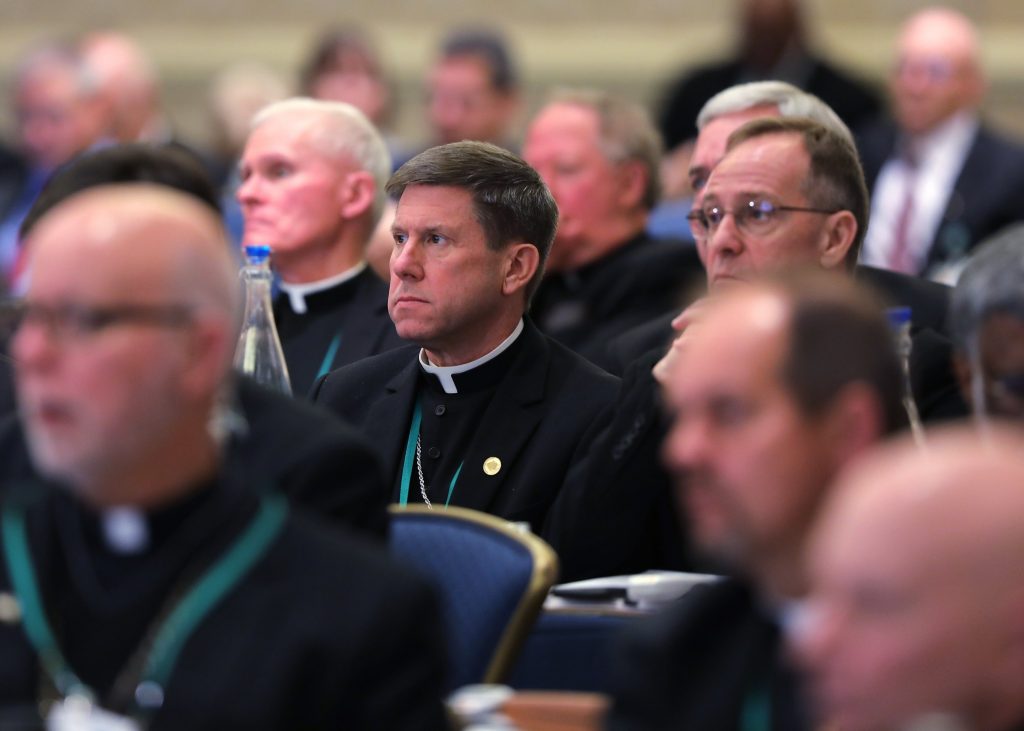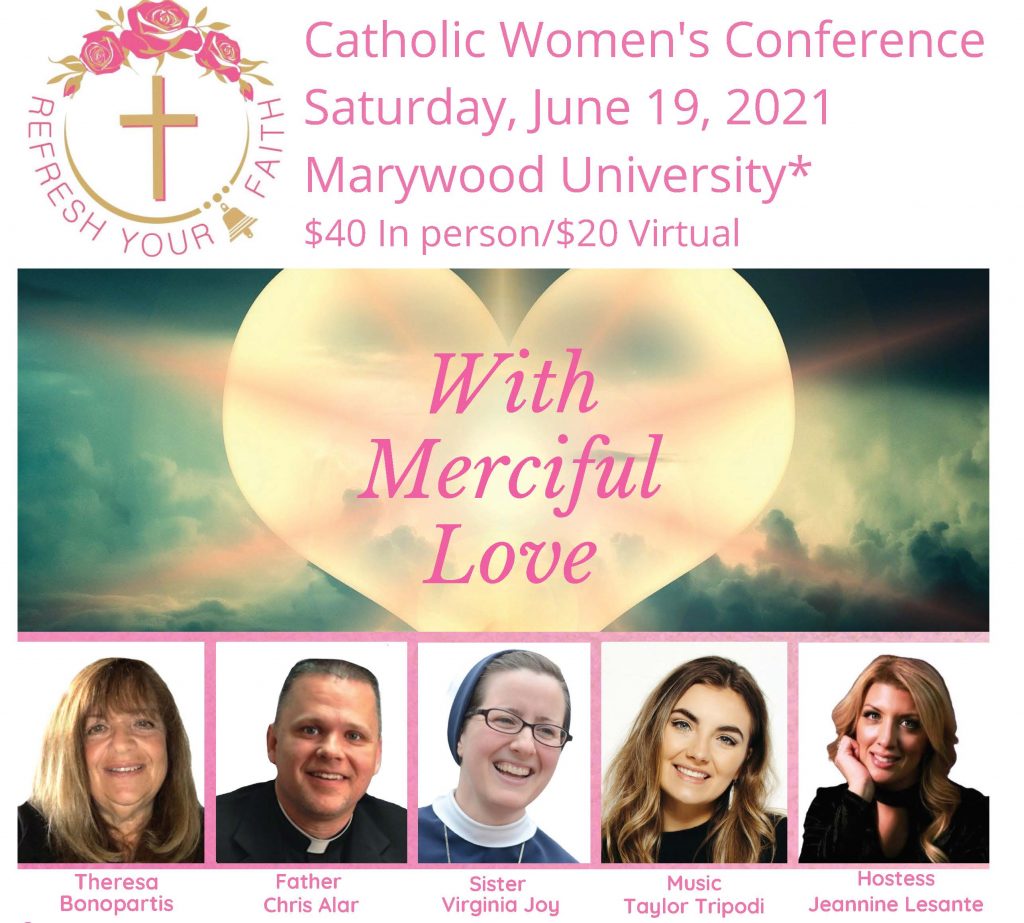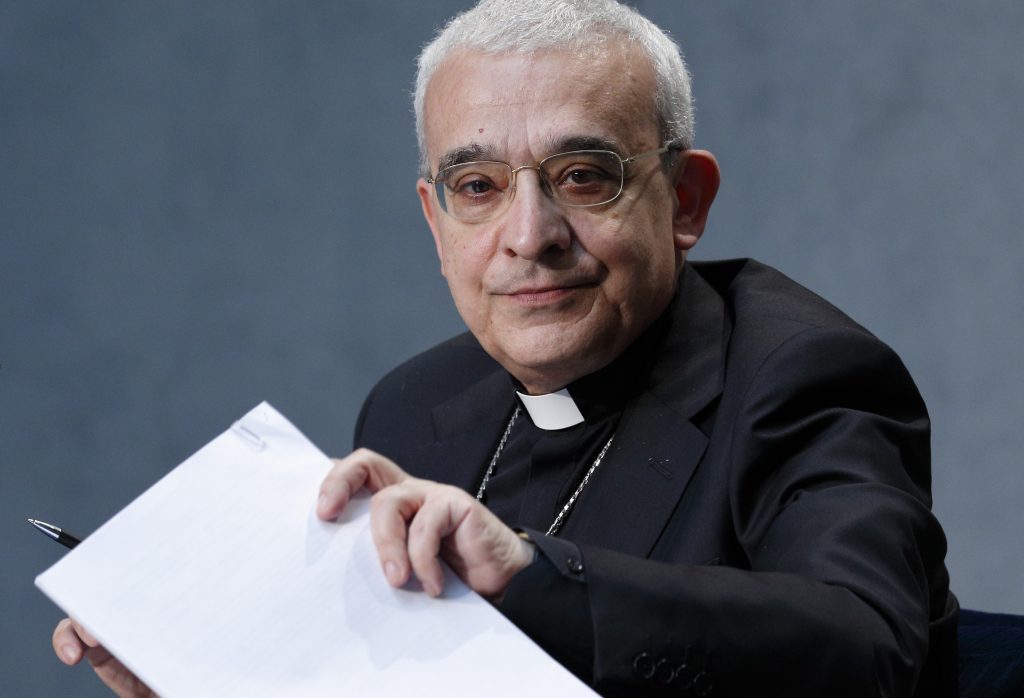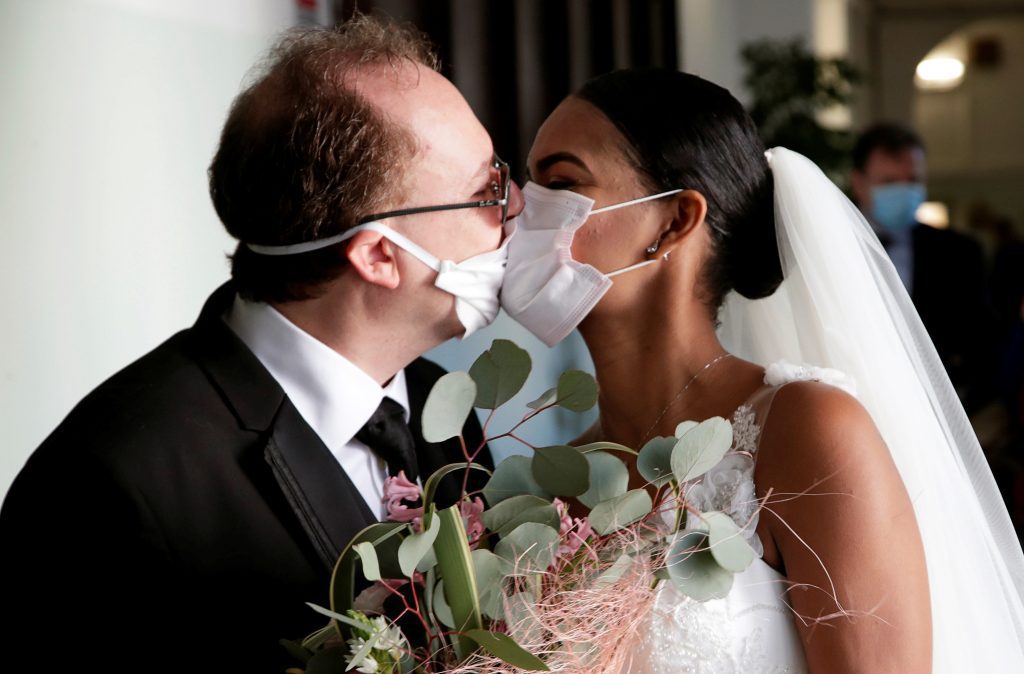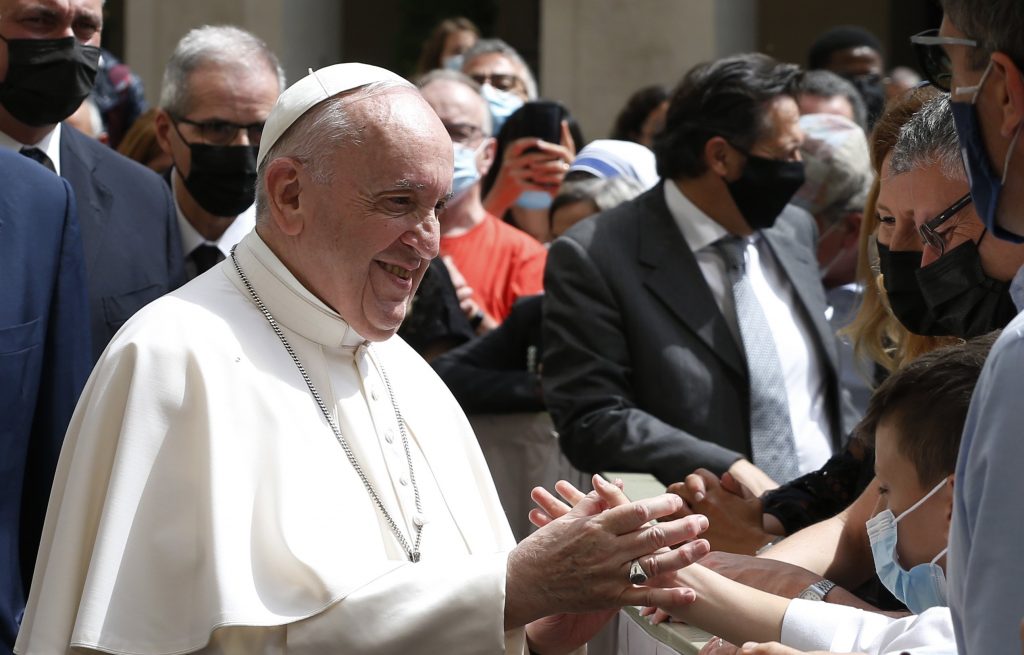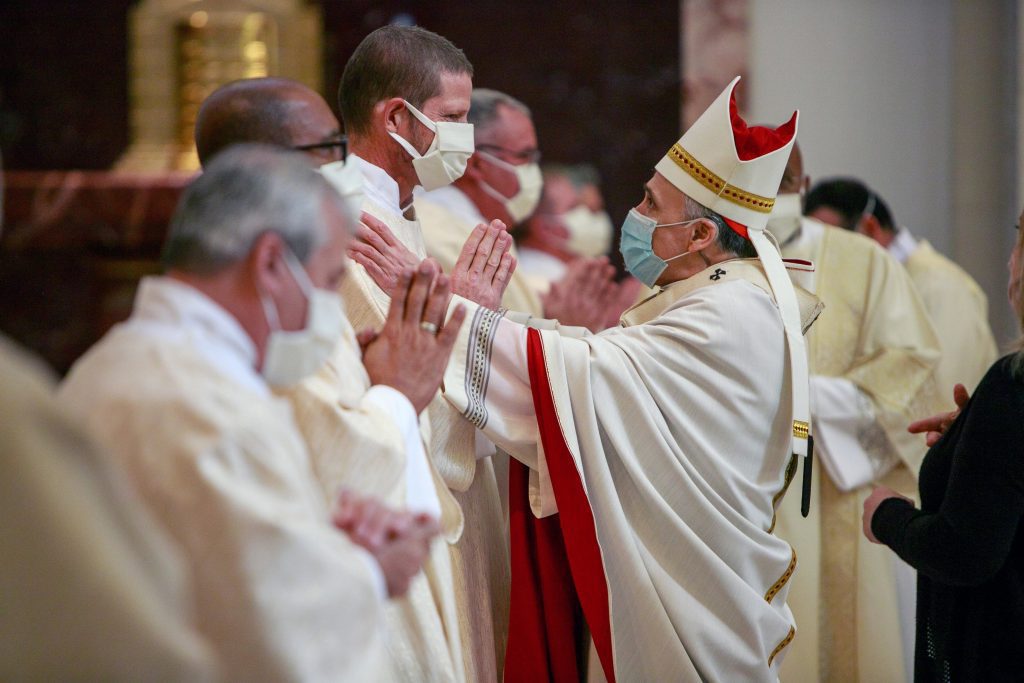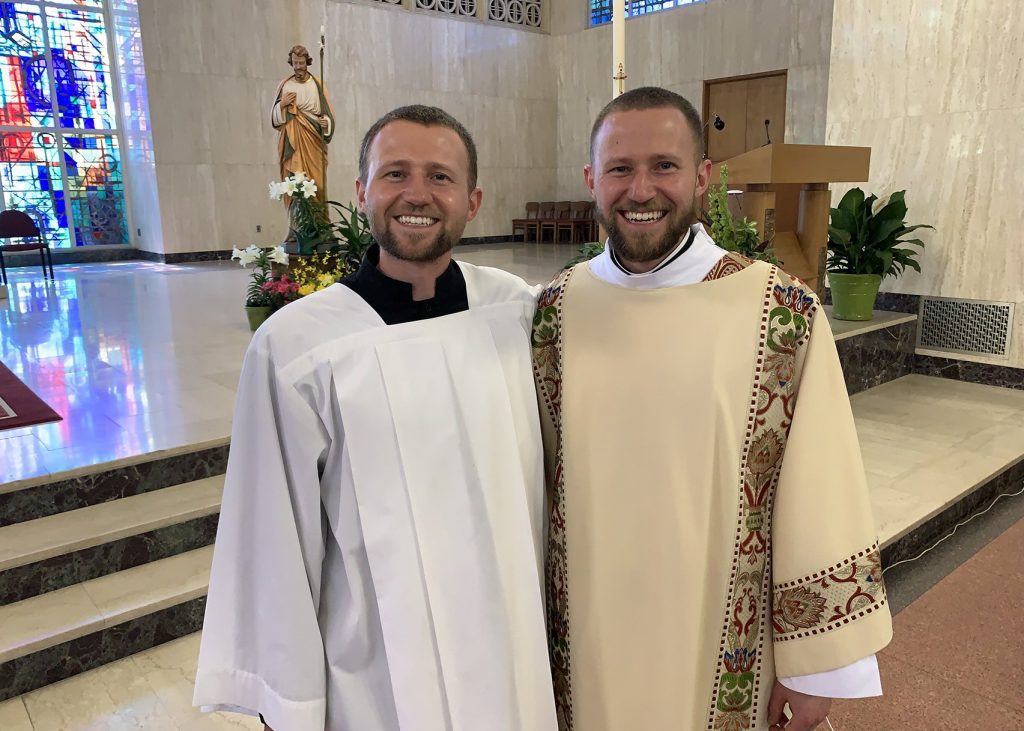
WASHINGTON (CNS) – Not a day goes by that identical twins Luke and Ben Daghir don’t get confused for each other.
It’s probably even more confusing now since Luke and Ben, both graduate seminarians, wear black shirts with white clerical collars.
“We’ve gotten so used to it, it’s become a part of our life,” said Luke during a June 3 interview with Catholic News Service held jointly with his brother. “You just smile.”
Just to add another layer of confusion, the twins grew up and went to Catholic schools in St. Marys, Pennsylvania — without the apostrophe — and are studying for the priesthood in Baltimore at St. Mary’s Seminary and University — yep, with the apostrophe.
There may be one way to tell the Daghir twins apart: Ben is further ahead than Luke in his graduate seminary work. Ben was ordained a transitional deacon in May, and if all goes well, will be ordained to the priesthood for the twins’ native Diocese of Erie, Pennsylvania, over the Memorial Day weekend next year.
Luke isn’t that far behind. He’s on schedule to be ordained a transitional deacon in 2023, and a priest in 2024, also serving the Erie Diocese. That would mean four ordinations in four years in the Daghir household.
It was Luke who heard the first callings to priesthood — as early as third grade, he said, with continued nudgings in high school — but Ben got what for him was a definitive calling in his early 20s when the twins were enrolled at Benedictine-run St. Vincent College in Latrobe, Pennsylvania.
Both twins were studying education while simultaneously being exposed to the Benedictine charism of religious life at St. Vincent. After graduation, Luke returned to their high school alma mater, Elk County Catholic in St. Marys; he coached tennis and taught at the same school where he and his brother had played baseball and basketball.
It posed a different kind of dilemma in discernment. Which kind of priesthood appealed more to them: diocesan or religious? They could see the appeal in each. “It really is a choice between two very good goods. Either route is an exceptional route to serve Christ or the church,” Luke said.
In his own discernment process, Ben recalled hearing a priest talk on the topic: “He drew a distinction between the diocesan priest and religious life. In religious life, there is community already established, you enter into it and you thrive in that environment. The diocesan priest is sent out on mission to create community.”
“I just feel called deep down to evangelize, to foster community. To foster hope in areas that are struggling. That has the heart of the diocesan priest, to create community,” Ben said. “I saw Ben enter first the seminary for the diocese,” Luke said. “With Ben in, it turned me toward the diocese. Deep down as a priest, I want to be in a parish.”
A 2012 data brief from the National Center for Health Statistics sets the U.S. twin birthrate at 16.7 twin sets per 1,000 live births in 2009 — nearly double the 1980 rate of 9.4. But not all twins are identical. Any twin set with a boy and a girl is a fraternal twin set, and not even all twin sets of the same sex are identical.
That would make the decision for twin brothers to join the priesthood, er, doubly rare. But the Erie Diocese already has a set of twins in the priesthood.
Luke, speaking from Creighton University in Omaha, Nebraska, during its annual Institute for Priestly Formation summer program, told CNS he was alerted to the presence of a Franciscan monk on the program faculty who himself has a Franciscan twin brother — and was going to seek him out.
Twinhood has its perks when it comes to Ben giving Luke a heads-up about what to expect in seminary life
“We were both big baseball players growing up. (Ben) being ahead in the seminary is similar to facing a pitcher earlier in a game. You’re going to go the person who’s already batted: What do they throw, what’s coming up?” Luke said. “In the seminary: How can I best prepare myself for this year, for this class, how can I learn from this professor? It’s really a special gift to ask him questions, knowing I’m going to get a good answer.”
Ben added, “There’s the delicate balance of letting a person enter the seminary and thrive.”
Parents can be ambivalent about a child going into a seminary or convent. “For me, they were extremely excited,” Ben said. “Our parents are extremely good at that. Not getting in the way between us and listening to the Lord, which is the most important thing.”
Ben added that when he told his folks of his plans, “Dad and me went for a walk that night. We just sat on the steps of our home parish we talked for an hour and a half … things he had seen in me long before. He had seen a priest but he didn’t want to push.”
“Ben and I have grown in sympathy with our parents. Seminary — it’s designed for the seminarian, it’s not designed for the parents,” Luke said. “There’s no program for the parents of 150 seminarians to be together” similar to the Creighton institute, he noted.
“There are beautiful images of Peter and John dropping their nets,” Ben added. “Not many talk about the parents having to drop their nets — their dreams, their hopes for having grandchildren. They have to drop them.”
Luke said, “Overall, I think they’ve been very supportive to us. We stay in contact. It’s fair to acknowledge it’s been challenging in ways, too. Our parents are reaching the age where all of their peers are having grandchildren.”
The twins have enjoyed seminary life, with the occasional odd challenge.
“There’s joy in seminary, I think that’s a message that needs to continue to be stated,” Luke said. “It’s a wonderful place of academic study, brotherhood — not just twin brothers, but brotherhood among men which is missing in our culture. The biggest thing is that if someone is thinking about seminary, it’s worth talking to the vocations director, take the big step, the big journey in front of you.”
After growing up with his twin and four years of dorm life in college, “the first time I ever had a room to myself was my first night of seminary,” Ben said. “Finally I had a room to myself, and I thought that was interesting. You do get your own room, and it took me, I’ll admit, several weeks to get used to having a room to myself. There were quiet moments that I was not expecting.”
“Jesus loves to call brothers,” Ben said, citing the apostles. Peter and Andrew and James and John. Another apostle was Thomas, whose name means “twin.” “It’s obvious 2,000 years later,” he added.
“Yes, we’re identical twins,” Luke said, “but on a deeper level, we’re genuinely being best friends, and that has grown and grown and grown in time.”


